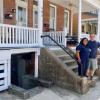Cape Henlopen School District officials will not go to referendum for any of its four locally funded projects that were granted certificates of necessity by the state’s Department of Education, the district’s board announced Dec. 12.
The decision to pause consideration for all four projects – a new swimming facility ($40.6 million), relocation of administrative headquarters ($21.4 million), a new facility for maintaining school buses ($5.9 million) and up to 103 acres for future development ($15.6 million) – comes after two previous failed referendums.
The district intends to wait for the property reassessment process to be completed to have a clear understanding of its impact before moving forward. In the meantime, it will take time to regroup and connect with community members, especially those new to the area, to educate them about the importance and relevance of these projects.
“I want to be able to balance the needs of our district with the will of our community,” said board President Alison Myers. “The last thing we all want to do is go back out to referendum for anything, and have our community say no to us again.”
Board member Jessica Tyndall expressed her frustration with the district’s previous failed referendums.
“With all these people moving here and retiring in these lovely homes, at some point, those homes are going to go to the next generation, and that generation is going to have children that go to these schools,” Tyndall said.
For that generation to want to live here, Tyndall continued, they’re going to want to have good schools and resources.
“It’s very, very tough, as someone that’s lived here all of [my] life, to understand that the people who have moved here don’t want to support this area,” she said. “[It’s] very hard to swallow.”
For residents like James Deegan, though, not all of the projects – which, if approved through a referendum, would be funded largely through increased taxes – are necessary.
The building of a new offsite pool facility of the proposed size is one example.
“I do not mind paying taxes for the benefit of our kids,” said Deegan, who’s been living in the area full time since 2014. “Cape does a great job with students. I do not think they should get into the pool business. The pool is a separate entity, not connected to anything, so you would still need to travel [there]. You would need to cover up great property with pavement and so forth, so that is my biggest concern, and how they would reduce the expense. And if they do reduce it, does that then go back to the taxpayers?”
The board clarified at the meeting that the pool facility would not be included in any upcoming plans, and that it instead will create a subgroup within its Long Range Facilities Planning Committee to evaluate the pros and cons of having a pool in the district, giving the community a structured way to engage in conversations and share input.
Ellen McIntyre is a reporter covering education and all things Dewey Beach. She graduated with a bachelor’s degree in journalism from Penn State - Schreyer Honors College in May 2024, then completed an internship writing for the Pittsburgh Post-Gazette. In 2023, she covered the Women’s World Cup in New Zealand as a freelancer for the Associated Press and saw her work published by outlets including The Washington Post and Fox Sports. Her variety of reporting experience covers crime and courts, investigations, politics and the arts. As a Hockessin, Delaware native, Ellen is happy to be back in her home state, though she enjoys traveling and learning about new cultures. She also loves live music, reading, hiking and spending time in nature.






















































